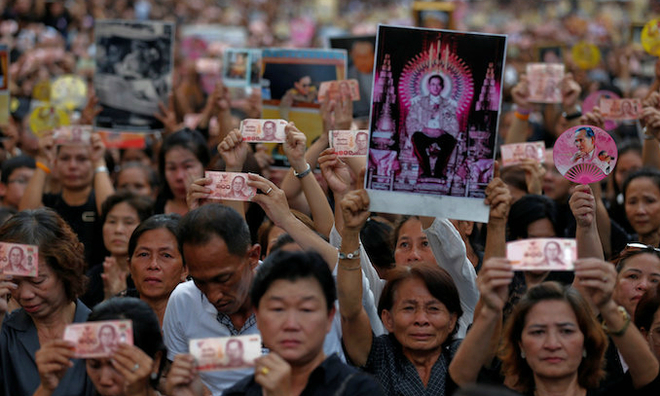Thai king's death adds to uncertainty about Obama's faltering Asia pivot
- Vietnamese leaders offer condolences on Thai King’s death
- Thailand’s King Bhumibol Abdulyadej passes away at 88
The king was important in cementing the long-standing alliance between the United States and Thailand after World War Two, in a reign that spanned the Vietnam War and development of the Association of Southeast Asian Nations (ASEAN), which Washington still considers vital to maintaining its influence in the region.
 |
| People hold Thai baht notes and portraits of Thailand's late King Bhumibol Adulyadej. (Photo: Reuters) |
King Bhumibol's death coincides with faltering momentum in Obama's signature policy of rebalancing the U.S. diplomatic and security focus to the Asia-Pacific region in the face of China's rapid rise.
The main economic pillar of the rebalance, the 12-nation Trans-Pacific Partnership trade deal, is languishing in the U.S. Congress with no guarantee that Obama will be able to push it through before leaving the presidency to Hillary Clinton or Donald Trump, both of whom say they oppose the deal.
Clinton, as secretary of state under fellow-Democrat Obama from 2009-13, was one of the architects of the policy but Republican Trump has questioned the extent to which he would maintain the U.S. security commitment to East Asia.
Obama's efforts to boost security ties with Southeast Asia have come in response to China's pursuit of territorial claims in the Vietnam's East Sea, a vital strategic waterway.
However, a torrent of anti-American rhetoric from new Philippines President Rodrigo Duterte has cast doubt on the U.S. military relationship with Manila just months after Washington reached an agreement on rotating access to bases in the country.
Other Southeast Asian countries, such as Indonesia and Malaysia, are focused on internal political issues and are avoiding playing any leadership role in ASEAN, while even traditionally reliable regional ally Australia is treading carefully to avoid jeopardizing its economic ties with Beijing.
Thailand was already occupying a back seat in regional affairs following a 2014 military coup seen as a means to maintain stability during the king's long illness. Thailand is expected to turn further inward during a prolonged mourning period and potentially politically fragile royal succession.
King Bhumibol's son, Crown Prince Maha Vajiralongkorn, who is expected to become Thailand's new king, lacks the strong connection to the United States of his father, who was born in Cambridge, Massachusetts.
Obama offered condolences to the Thai people and the King's family, calling King Bhumibol "a tireless champion of his country's development."
Obama's former top Asia adviser, Evan Medeiros, now at the Eurasia Group, said the mourning process would likely slow a return to democratic government and Prince Vajiralongkorn was a source of "profound uncertainty."
"He’s such an unknown, unpredictable figure," he said.
U.S. State Department spokesman Mark Toner said the United States and Thailand had been close friends for two centuries.
"Our friendship and our partnership have weathered many challenges … we expect it to continue to grow stronger," Toner told a regular news briefing.
While the United States backed a return to democracy, Toner said it would be "premature... to lay our expectations for the near term" as Thailand mourned.
Much has changed
While Washington condemned the 2014 coup, it has kept security ties with Bangkok, particularly through annual military exercises called Cobra Gold.
"The fact that we have been able to remain closely tethered and stayed largely on track with Cobra Gold and other cooperative efforts, notwithstanding the military takeover ... is testament to the strong roots we have put down and the work that we’re doing,” the senior U.S. diplomat for Asia, Assistant Secretary of State Daniel Russel, said on Wednesday.
Murray Hiebert of Washington's Center for Strategic and International Studies think tank, said much had changed since Obama announced his pivot policy in 2011.
"The king's death adds to uncertainty in Southeast Asia, a region in considerable flux already. This makes the U.S. rebalance to Asia more difficult because the situation in so many countries is that of 'wait and see.'
"When the pivot started, you had Thailand engaged, a new leader in Malaysia who wanted to engage, you had Aquino coming in the Philippines and very forward-leaning internationally and very open to the U.S.; you had an internationalist president in Indonesia. It was a rather different dynamic."
King Bhumibol's death means Washington finds itself having to rely even more on Vietnam for any kind of strategic ballast in the region.
"The Vietnamese are providing the dynamism when it comes to strategic thinking," U.S. Ambassador to Vietnam Ted Osius said in Washington on Tuesday.
"Indonesia is very internally focused right now ... Thailand is very internally focused, and Malaysia has a rolling political crisis," he continued.
"I don’t know exactly what direction the Philippines is headed; Singapore has a lot of strategic thinkers but it’s a city state; I don’t think you can really count on Laos, Cambodia and Myanmar to provide the strategic engine for ASEAN."
There appears little prospect for now, however, that Vietnam would be willing to open its doors further to the U.S. military should the deal with the Philippines run into problems, given past animosities and concerns about China.
“I do not expect the Vietnamese calculation to be, ‘Oh, the Philippines is doing whatever it’s doing, let’s race full steam ahead with the United States.’ No, that’s not about to happen," Osius said.
"The Vietnamese have been very measured in the pace at which they have expanded the security relationship."
Hiebert said Asian countries remain keen on the U.S. pivot, given their worries about China, but the pace was likely to flag further, presenting a tougher task to revive the initiative once Obama leaves power.
"I wouldn't declare the pivot dead ... I think there's still quite a bit of interest in the U.S., but some of the sort of dynamism that we saw earlier about building the region is a little bit diminished right now," he said.

